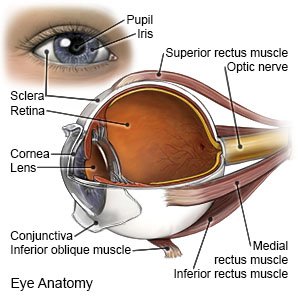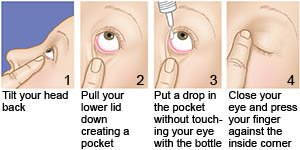Uveitis
Medically reviewed by Drugs.com. Last updated on Oct 29, 2024.
Uveitis is inflammation inside one or both eyes. The inflammation damages parts of the eye. Uveitis usually damages the uvea (a thin layer inside the outer wall of the eye), but any part of your eye may be damaged. Treatment is needed to prevent serious damage and loss of vision.
 |
DISCHARGE INSTRUCTIONS:
Seek care immediately if:
- You suddenly lose your vision.
- Your pain gets worse, even after treatment.
- Your vision suddenly gets worse.
- You have severe eye pain.
Call your doctor or ophthalmologist if:
- You have questions or concerns about your condition or care.
Medicines:
You may need any of the following:
- Steroid eye drops help decrease pain and inflammation. These are only used for a short time to relieve the inflammation. The way steroids are given will depend on which part of your eye is affected. You may be given pills if the cause of your uveitis is not an infection. Steroids may also be given as injections into the area around your eye.
- Cycloplegic eye drops dilate your pupil and relax your eye muscles. This helps decrease pain and light sensitivity.
- Take your medicine as directed. Contact your healthcare provider if you think your medicine is not helping or if you have side effects. Tell your provider if you are allergic to any medicine. Keep a list of the medicines, vitamins, and herbs you take. Include the amounts, and when and why you take them. Bring the list or the pill bottles to follow-up visits. Carry your medicine list with you in case of an emergency.
Treatment options
The following list of medications are related to or used in the treatment of this condition.
Manage uveitis:
- Get an eye exam every 1 to 2 years, or as directed. Early diagnosis and treatment of eye problems may prevent permanent damage.
- Apply a warm compress to your eye. Wet a washcloth in warm water and wring it out. Place it gently over your eye for 20 minutes 3 to 4 times each day. This will help soothe your eye.
- Wear dark sunglasses. This will help prevent pain and light sensitivity. Make sure the sunglasses have UVA and UVB protection. This will protect your eyes when you go outside.
- Use eye drops safely. If your treatment plan includes eye drops, it is important to use them as directed. Your provider may give you detailed instructions to follow. The eye drops may also come with safety instructions. Follow all instructions to help prevent an infection. Do not touch the tip of the bottle to your eye. Germs from your eye can spread to the medicine bottle.

Follow up with your doctor or ophthalmologist as directed:
You may need ongoing vision tests. You may also be referred to a specialist to check for a disease or condition that can cause uveitis. Write down your questions so you remember to ask them during your visits.
© Copyright Merative 2024 Information is for End User's use only and may not be sold, redistributed or otherwise used for commercial purposes.
The above information is an educational aid only. It is not intended as medical advice for individual conditions or treatments. Talk to your doctor, nurse or pharmacist before following any medical regimen to see if it is safe and effective for you.
Further information
Always consult your healthcare provider to ensure the information displayed on this page applies to your personal circumstances.
